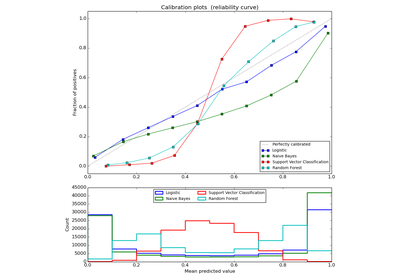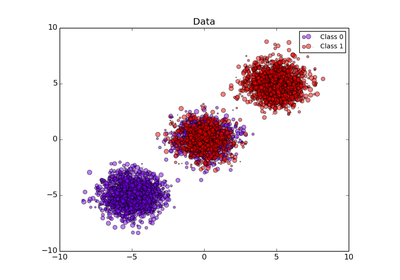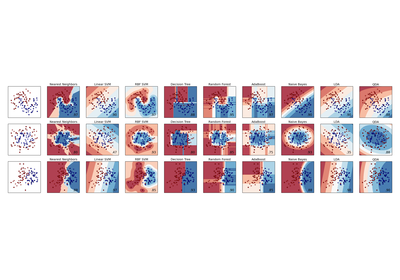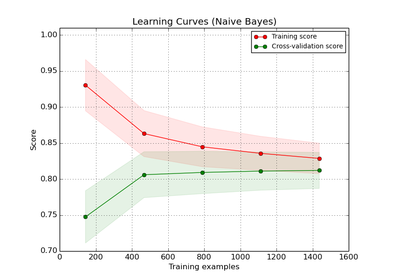sklearn.naive_bayes.GaussianNB¶
- class sklearn.naive_bayes.GaussianNB¶
Gaussian Naive Bayes (GaussianNB)
Attributes: `class_prior_` : array, shape = [n_classes]
probability of each class.
`theta_` : array, shape = [n_classes, n_features]
mean of each feature per class
`sigma_` : array, shape = [n_classes, n_features]
variance of each feature per class
Examples
>>> import numpy as np >>> X = np.array([[-1, -1], [-2, -1], [-3, -2], [1, 1], [2, 1], [3, 2]]) >>> Y = np.array([1, 1, 1, 2, 2, 2]) >>> from sklearn.naive_bayes import GaussianNB >>> clf = GaussianNB() >>> clf.fit(X, Y) GaussianNB() >>> print(clf.predict([[-0.8, -1]])) [1]
Methods
fit(X, y) Fit Gaussian Naive Bayes according to X, y get_params([deep]) Get parameters for this estimator. predict(X) Perform classification on an array of test vectors X. predict_log_proba(X) Return log-probability estimates for the test vector X. predict_proba(X) Return probability estimates for the test vector X. score(X, y[, sample_weight]) Returns the mean accuracy on the given test data and labels. set_params(**params) Set the parameters of this estimator. - __init__()¶
x.__init__(...) initializes x; see help(type(x)) for signature
- fit(X, y)¶
Fit Gaussian Naive Bayes according to X, y
Parameters: X : array-like, shape = [n_samples, n_features]
Training vectors, where n_samples is the number of samples and n_features is the number of features.
y : array-like, shape = [n_samples]
Target values.
Returns: self : object
Returns self.
- get_params(deep=True)¶
Get parameters for this estimator.
Parameters: deep: boolean, optional :
If True, will return the parameters for this estimator and contained subobjects that are estimators.
Returns: params : mapping of string to any
Parameter names mapped to their values.
- predict(X)¶
Perform classification on an array of test vectors X.
Parameters: X : array-like, shape = [n_samples, n_features]
Returns: C : array, shape = [n_samples]
Predicted target values for X
- predict_log_proba(X)¶
Return log-probability estimates for the test vector X.
Parameters: X : array-like, shape = [n_samples, n_features]
Returns: C : array-like, shape = [n_samples, n_classes]
Returns the log-probability of the samples for each class in the model. The columns correspond to the classes in sorted order, as they appear in the attribute classes_.
- predict_proba(X)¶
Return probability estimates for the test vector X.
Parameters: X : array-like, shape = [n_samples, n_features]
Returns: C : array-like, shape = [n_samples, n_classes]
Returns the probability of the samples for each class in the model. The columns correspond to the classes in sorted order, as they appear in the attribute classes_.
- score(X, y, sample_weight=None)¶
Returns the mean accuracy on the given test data and labels.
Parameters: X : array-like, shape = (n_samples, n_features)
Test samples.
y : array-like, shape = (n_samples,)
True labels for X.
sample_weight : array-like, shape = [n_samples], optional
Sample weights.
Returns: score : float
Mean accuracy of self.predict(X) wrt. y.
- set_params(**params)¶
Set the parameters of this estimator.
The method works on simple estimators as well as on nested objects (such as pipelines). The former have parameters of the form <component>__<parameter> so that it’s possible to update each component of a nested object.
Returns: self :






